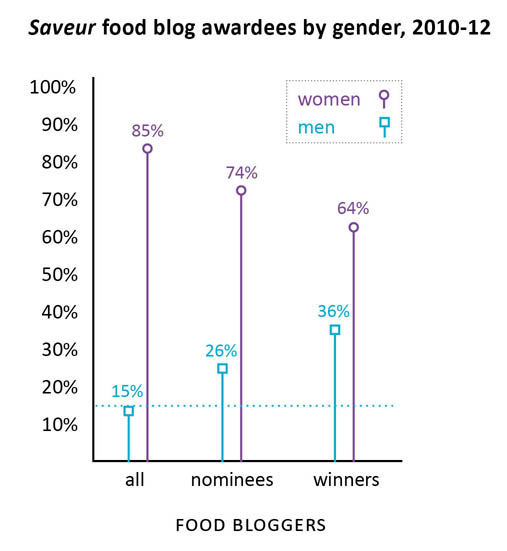
Gender in food blogging
Last summer I conducted a survey of food bloggers (N=283) which found that 85% of food bloggers are women (see here for more demographic statistics from the survey). I also conducted interviews with food bloggers and started to get the impression that food blogging is a community dominated by women in which the relatively few men end up being disproportionately successful. This kind of gender disparity – a group that is overwhelmingly women in which men are more likely to occupy positions of power or prestige – has been written about in the sociological literature with respect to elementary school teaching and nursing. In elementary schools, for example, the majority of the teachers were women but administrators (like the principal and vice principals) were disproportionately likely to be men. This gender disparity in the schools is no longer as pronounced as it once was. Women now occupy more of the administrative positions but men have not moved in to occupy more teaching positions. If food blogging follows the same trajectory, we can expect women to occupy more of the most prominent food blogging positions over time.
But what is a ‘prominent food blogging position’?
Since food bloggers are not working professionals within a clear hierarchy like teachers and nurses, I decided to look at food blog awards data as a proxy for success in the food blog world. The magazine Saveur hosts the longest running, most extensive set of food blogging awards of any organization. I used their awards nominees and winners to pull together the graphic above and find out how gender and success in food blogging interact.
Using the Saveur awards data, it is clear that there is a pattern of disproportionate male success within the food blog nominees and winners. In a perfectly gender-neutral world, we would expect that when 15% of the food blogs are written by men, 15% of the food blogging awards will be distributed to men. In fact, 26% of the nominees (chosen by Saveur) were men and 36% of the winners (voted on by the internet audience) were men. In other words, both the Saveur selections and the internet-audience voters were inclined to select men more often than strict chance would have predicted.
My interviews indicated that there could be a few explanations for this kind of pattern. However, I’m curious to hear what food bloggers – especially those who voted for or won Saveur‘s awards – have to say.
The comments are open.
Methodological note
N=194
I removed blogs whose writers’ genders were not revealed and blogs written by couples or other mixed-gender groups. I also removed blogs that did not meet my original definition of food blog which include the two categories for blogs about alcohol and the category for blogs about kitchen tools/gadgets.
References
Saveur Food Blog Awards 2012.
Saveur Food Blog Awards 2011.
Saveur Food Blog Awards 2010.
Norén, Laura. (2012) Saveur food blog award nominees and winners by gender, 2010-2012. [Blog post] Graphic Sociology blog.

Comments 4
David — June 18, 2012
I think there are other explanations of this gap.
The given explanation implies a prejudice against women and for men.
What could also be happening is that the percent of women and men more closely reflects the possibility of men and women being equally good bloggers that are worthy of awards. The total percent of women and men bloggers might show that food blogging is more interesting to women than men. So more women start their own blog. The percent of nominees might show that because more women, some of them amateur, start their own blog and the likely outcome of men and women being equally capable of running a good blog is actually diluted.
There could be something intrinsic in the way men and women run food blogs as well. If women have a certain style or subject, and men have another. Maybe more awards are given to men, relatively, because there is less competition.
Not necessarily some cultural bias.
Kiki — June 30, 2012
But why reach for a more complicated explanation which has no evidence to back it, and, in my opinion, would quickly start to draw on false gender stereotypes, when a much simpler and better-documented explanation is presented?
Ciccina — June 30, 2012
"There could be something intrinsic in the way men and women run food blogs as well. If women have a certain style or subject, and men have another."
Indeed, David, its an intrinsic difference. Men are born with an extra chromosome that makes them especially good food bloggers. Also, men have six fingers on each hand, which means they can type really super fast and thus publish more blog posts. More posts = more chances for a high quality post, ergo men get a disproportionate number of awards.
Could be a style difference though - lady food bloggers frequently interrupt their posts to comment on cute shoes and their horoscopes. Food blogger judges frown on this style.
Or maybe its like you suggest - more ladies are food bloggers, so the quality is diluted. With men, fewer of them choose to do it, so the ones who do are of course higher quality. Wait, what?
Jeez.
David — July 3, 2012
I seem to not have explained my anecdote well enough.
I have just come across more women food bloggers in my everyday life who receive encouragement, despite any other defined characteristic.
Maybe because it's more socially acceptable for women to have a food blog, poor women bloggers receive encouragement men otherwise would not receive at the same level of proficiency. Or maybe men below a certain competency are actually discouraged.